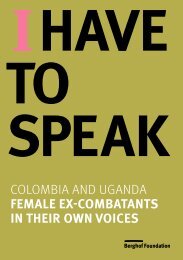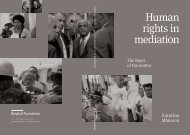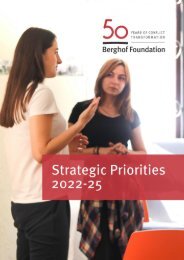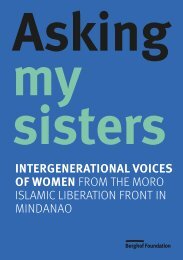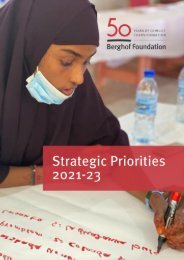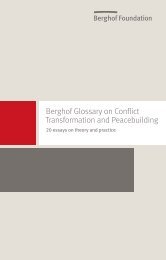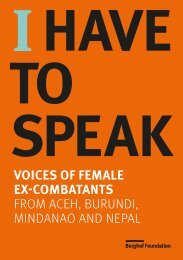Berghof Foundation: 50 years of conflict transformation
This book provides an overview of the Berghof Foundation’s work and impact over the past 50 years and sheds light on the challenges ahead of peacebuilding.
This book provides an overview of the Berghof Foundation’s work and impact over the past 50 years and sheds light on the challenges ahead of peacebuilding.
Create successful ePaper yourself
Turn your PDF publications into a flip-book with our unique Google optimized e-Paper software.
Sri Lanka 2001–2008<br />
Supporting<br />
inclusive<br />
peacebuilding<br />
efforts on<br />
different tracks<br />
While the 1990s witnessed a significant number <strong>of</strong><br />
successful peace accords and an emerging optimism<br />
about the realisation and diffusion <strong>of</strong> a ‘liberal peace’<br />
doctrine, the developments in Sri Lanka gave little<br />
cause for hope. After a failed attempt at peace<br />
talks with the Tamil Tigers (LTTE) under President<br />
Chandrika Kumaratunga, Sri Lanka disintegrated into<br />
the third phase <strong>of</strong> a brutal civil war that raged across<br />
the island’s north and east. It was fuelled by anti-Tamil<br />
pogroms, suicide attacks by the LTTE, excessive use<br />
<strong>of</strong> landmines, the recruitment <strong>of</strong> underage minors<br />
and the inability <strong>of</strong> the two dominant Sinhala parties<br />
to find a reasonable compromise on power-sharing.<br />
At the end <strong>of</strong> the decade, the LTTE had<br />
achieved a powerful military position and declared<br />
a unilateral ceasefire. The ceasefire was later<br />
reciprocated by the government, opening the space<br />
for capacity- and confidence-building activities<br />
that would ultimately pave the way for meaningful<br />
negotiations between the warring parties.<br />
This was the context when the <strong>Bergh<strong>of</strong></strong><br />
<strong>Foundation</strong> became active in Sri Lanka in 2001 at<br />
the invitation <strong>of</strong> the Government <strong>of</strong> Sri Lanka and<br />
with support from the Swiss Department <strong>of</strong> Foreign<br />
Affairs and the German Development Ministry.<br />
The overarching goal was to strengthen local<br />
peacebuilding capacities and create spaces for<br />
dialogue to improve relations and trust among the<br />
warring parties and its constituencies.<br />
Designed as a comprehensive intervention<br />
on different levels, the <strong>Bergh<strong>of</strong></strong> <strong>Foundation</strong>’s<br />
engagement particularly focused on developing<br />
opportunities for dialogue and problem-solving, on<br />
building the capacities <strong>of</strong> <strong>conflict</strong> parties and civil<br />
society, and on promoting multiple futures for a<br />
peaceful Sri Lanka through constitutional and state<br />
reform and power-sharing.<br />
In order to foster a more informed peace<br />
process, we introduced state-<strong>of</strong>-the-art negotiation<br />
and mediation practices to representatives from<br />
both <strong>conflict</strong> parties and shared knowledge from<br />
other peace processes. High-level politicians and<br />
experts from Northern Ireland and South Africa<br />
who had played a key role in the negotiations<br />
and <strong>transformation</strong> processes in their countries<br />
provided key insights and lessons learned. They<br />
explained why they had changed their attitudes<br />
towards a compromise and how this had helped<br />
transform the <strong>conflict</strong> and change their country<br />
for the better. To implement these activities on<br />
the ground, we established the Resource Network<br />
for Conflict Studies and Transformation Sri Lanka<br />
(RNCST), our first formal <strong>of</strong>fice outside Germany.<br />
With around 20 staff members, most <strong>of</strong> whom were<br />
locally hired, the RNCST provided a safe space for<br />
both <strong>conflict</strong> parties to explore their interest and<br />
readiness to engage in dialogue with each other. The<br />
aim was to increase empathy and overcome mutual<br />
mistrust after decades <strong>of</strong> war and hostility, and to<br />
develop ideas and ultimately a roadmap for a future<br />
peace process.<br />
Unfortunately, our operations ended abruptly<br />
when hostilities resumed in 2008 and when the<br />
visas <strong>of</strong> key <strong>Bergh<strong>of</strong></strong> personnel were not extended.<br />
Over the course <strong>of</strong> its engagement in Sri Lanka,<br />
the <strong>Bergh<strong>of</strong></strong> <strong>Foundation</strong> contributed to a range <strong>of</strong><br />
new initiatives and ideas that aimed to address the<br />
protracted <strong>conflict</strong> and supported more than 200<br />
projects and established a network <strong>of</strong> civil society<br />
organisations and individuals in support <strong>of</strong> peace<br />
work that endured long after the programme ended.<br />
The <strong>Bergh<strong>of</strong></strong> <strong>Foundation</strong> was also instrumental<br />
in the establishment <strong>of</strong> a peace secretariat for<br />
Muslims, a neglected minority in Sri Lanka that was<br />
not represented at the peace table at that time. Our<br />
work with the Sri Lankan and Tamil diasporas on<br />
development and peace was commended by many<br />
international scholars for its pioneering character at<br />
the nexus <strong>of</strong> diaspora and <strong>conflict</strong> <strong>transformation</strong>.<br />
Most notably, however, we succeeded in creating<br />
inclusive dialogue spaces in an otherwise exclusive,<br />
polarised and ethnicised context.<br />
70<br />
Colombo, Sri Lanka in the early 1990s.<br />
Photo: Creative Commons (CC BY 3.0) by qwesy qwesy / Panoramio<br />
71




